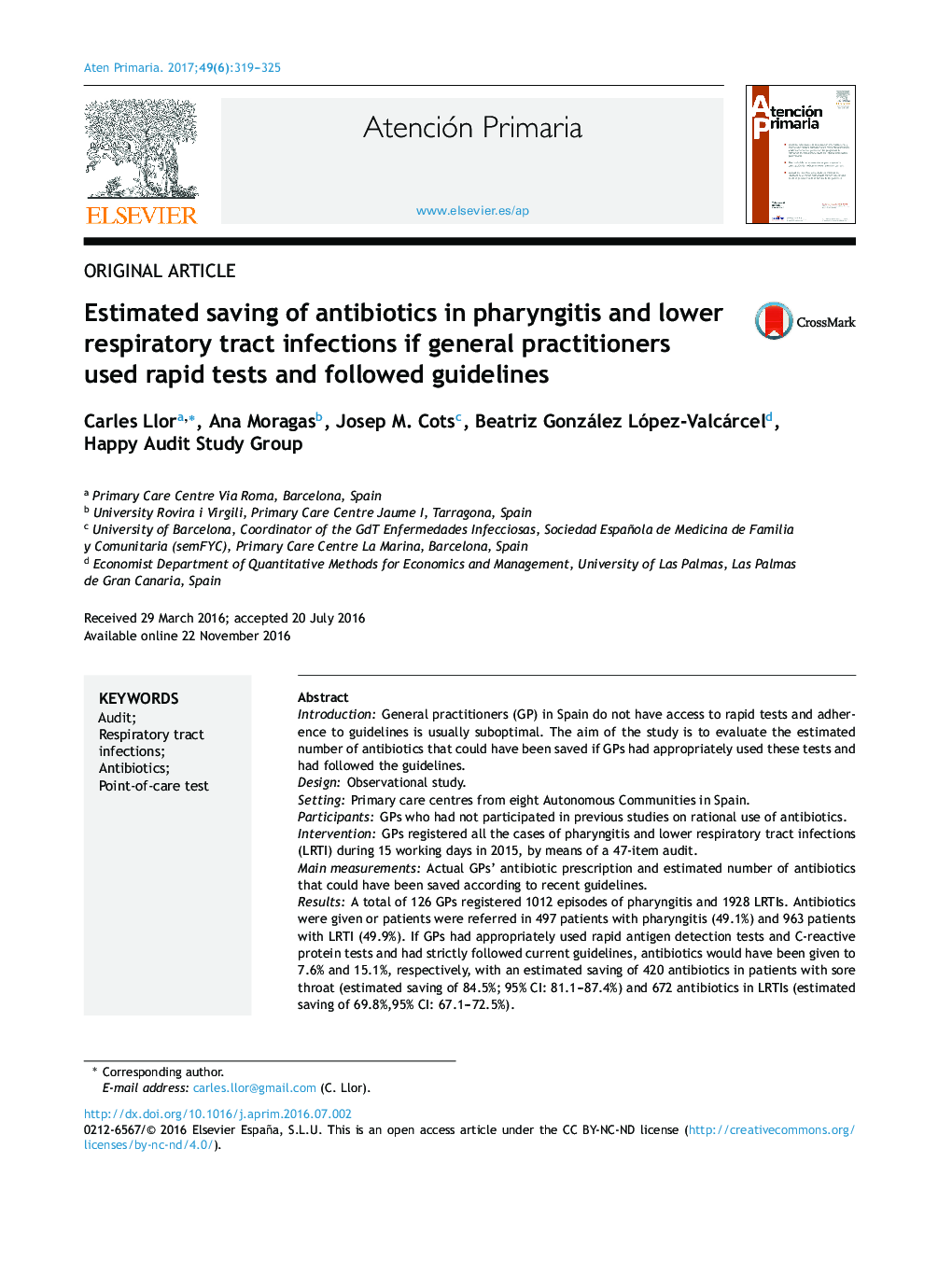| Article ID | Journal | Published Year | Pages | File Type |
|---|---|---|---|---|
| 5677999 | Atención Primaria | 2017 | 7 Pages |
IntroductionGeneral practitioners (GP) in Spain do not have access to rapid tests and adherence to guidelines is usually suboptimal. The aim of the study is to evaluate the estimated number of antibiotics that could have been saved if GPs had appropriately used these tests and had followed the guidelines.DesignObservational study.SettingPrimary care centres from eight Autonomous Communities in Spain.ParticipantsGPs who had not participated in previous studies on rational use of antibiotics.InterventionGPs registered all the cases of pharyngitis and lower respiratory tract infections (LRTI) during 15 working days in 2015, by means of a 47-item audit.Main measurementsActual GPs' antibiotic prescription and estimated number of antibiotics that could have been saved according to recent guidelines.ResultsA total of 126 GPs registered 1012 episodes of pharyngitis and 1928 LRTIs. Antibiotics were given or patients were referred in 497 patients with pharyngitis (49.1%) and 963 patients with LRTI (49.9%). If GPs had appropriately used rapid antigen detection tests and C-reactive protein tests and had strictly followed current guidelines, antibiotics would have been given to 7.6% and 15.1%, respectively, with an estimated saving of 420 antibiotics in patients with sore throat (estimated saving of 84.5%; 95% CI: 81.1-87.4%) and 672 antibiotics in LRTIs (estimated saving of 69.8%,95% CI: 67.1-72.5%).ConclusionsGP adherence to guidelines and a correct introduction of rapid tests in clinical practice in Spain could result in a considerable saving of unnecessary prescription of antibiotics in pharyngitis and LRTIs.
ResumenIntroducciónLos médicos de familia (MF) en España no tienen acceso a pruebas rápidas y la adherencia a las guÃas clÃnicas es subóptima. El objetivo del estudio es evaluar el número estimado de antibióticos que podrÃan ahorrarse si los MF hubiesen usado las pruebas correctamente y hubieran seguido las guÃas.DiseñoEstudio observacional.EmplazamientoCentros de atención primaria en 8 Comunidades Autónomas.ParticipantesMF que no habÃan participado en estudios anteriores sobre uso racional de antibióticos.IntervenciónLos MF registraron los casos de faringitis e infecciones del tracto respiratorio inferior (ITRI) durante 15 dÃas en 2015, mediante un audit de 47 Ãtems.Mediciones principalesPrescripción real de antibióticos realizada por los MF y antibióticos que se hubiesen ahorrado en base a las guÃas clÃnicas.Resultados126 MF registraron 1.012 faringitis agudas y 1.928 ITRI. Se prescribieron antibióticos o fueron derivados 497 pacientes con faringitis (49,1%) y 963 con ITRI (49,9%). Si los MF hubiesen usado pruebas rápidas de detección antigénica y proteÃna C reactiva y hubieran seguido las directrices, se hubieran dado antibióticos al 7,6% y al 15.1%, respectivamente, con un ahorro estimado de 420 antibióticos en pacientes con faringitis (84,5%; IC 95%: 81,1-87,4%) y 672 antibióticos en pacientes con ITRI (69.8%, IC 95%: 67.1-72.5%).ConclusionesLa adherencia de los MF a las guÃas clÃnicas y una correcta introducción de las pruebas rápidas en la práctica clÃnica en España podrÃan reducir de forma considerable la prescripción innecesaria de antibióticos en la faringitis aguda y en las ITRI.
